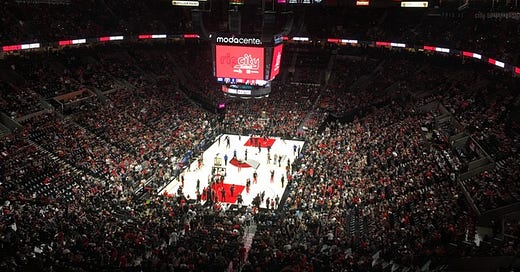Trail Blazers, like the city they call home, need leadership
Portland and its NBA team find themselves in difficult situations for some of the same reasons
Most of the sports world views Portland through the lens of the Trail Blazers, the city’s NBA team and for decades Oregon’s only major league sports team. Like the city it calls home, the Blazers are struggling – and for many of the same reasons.
Before delving into those reasons, let’s first review the team’s struggles.
The Blazers entered this season trying one more time to prove that their two best players, Damian Lillard and C.J. McCollum, could be the foundation of a title-contending team with the help of a new coach and a few minor roster changes. It never was a good plan, most basketball observers agreed. McCollum and Lillard replicated each other instead of complementing each other. Both are below-average defensive players. And, you can only “run it back” so many times before realizing you’ve already gone as far as you can go.
The plan went from questionable to untenable when both Lillard and McCollum, as well as other players, suffered injuries. The Blazers traded McCollum and some other players for draft picks and unproven players with potential (maybe). Fans have been very unhappy with the roster moves.
Residents of Portland have had other reasons to complain. The city of Portland entered the year hoping to put COVID-19 in the rearview mirror, make progress on long-festering problems such as homelessness, affordable housing, and a broken relationship between the community and Portland Police Bureau. COVID is slowly fading, though case counts remain moderately high and tensions over mask policies and, in particular, school COVID policies remain even higher. Crime continues to rise and there have been more officer-involved shootings under questionable circumstances.
No noticeable progress has been made on homelessness or affordable housing and each proposal from the mayor’s office draws criticism. And, inevitably, stalls. Portland residents might be even unhappier than Blazers fans – if that’s possible.
So, what are the common reasons for the struggles of the city of Portland and it’s NBA team? There are several, but two stand out.
Lack of leadership
The Blazers have a short-term (in all likelihood) owner who inherited the team, an interim general manager, and a first-year coach with no previous head-coaching experience. The team’s likelihood of executing any plan is reduced until Jody Allen either sells the team or demonstrates she is committed to it by giving top-notch basketball executives authority and freedom to run the franchise. Hiring a general manager, or removing “interim” from Joe Cronin’s title, would be a first step.
Portland has not had an effective mayor since Vera Katz’s last term ended in January 2005. The city has treated mayors like automobiles. They keep trading for new models, and they keep getting lemons. Ted Wheeler is the first two-term mayor since Katz, and as unpopular as he is, he probably isn’t the worst mayor in that stretch. Part of the problem is the city’s commission form of government. It’s so unusual and ineffective that no other major U.S. city uses it. Changing the form of government requires changing the city charter, a time-consuming process that has been attempted and failed. A charter review is underway again, and this time it needs to lead to a new form of government.
Unrealistic expectations
Many Blazers fans, stoked by the distant memory of a 1977 NBA Championship, as well as more recent trips to the NBA Finals (in the 1990s) and Western Conference championship series (as recently as 2019), think Portland should be a perennial title contender. The truth is the franchise has been an overachiever by median standards for small-market NBA teams.
The Blazers and the city find themselves in opposite situations. Though there’s some urgency because of the age of Lillard, the Blazers can afford to take a somewhat deliberate approach. That approach is reflected in the McCollum trade and other personnel moves. The team is getting younger and hoping to acquire a future star in the draft. That’s the most likely path to success for a small-market team.
The city, on the other hand, needs immediate progress on homelessness and crime. Yet, listening to an activist base with unrealistic expectations, it rejects almost all short-term solutions as inadequate. It simply is not possible to immediately solve either problem, especially homelessness. Rejecting less-than-perfect proposals that would provide some relief only makes a long-term solution more difficult.
The frustrating part of this situation for both Blazers fans and Portland residents is that both the team and the city have more strengths than weaknesses. Virtually every NBA team would like to have Lillard and Portland’s loyal fan base. Despite its short-term problems, Portland continues to draw migrants who are attracted by the city’s amenities. That’s why there’s hope and why the right leader could deliver great victories – literally in the case of the Blazers and metaphorically in the case of the city.
Mark worked 20 years at The Oregonian in positions including sports editor & editorial writer. He currently is a communications consultant.




